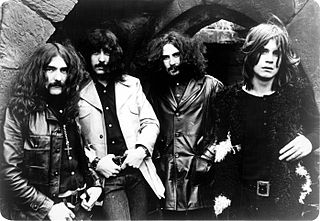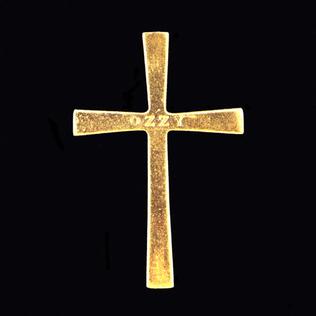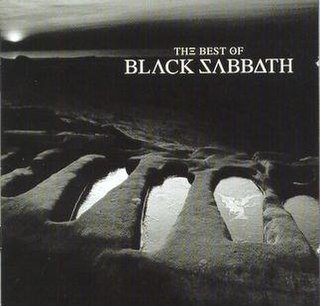Related Research Articles

Black Sabbath were an English rock band formed in Birmingham in 1968 by guitarist Tony Iommi, drummer Bill Ward, bassist Geezer Butler and vocalist Ozzy Osbourne. They are often cited as pioneers of heavy metal music. The band helped define the genre with their first three albums Black Sabbath (1970), Paranoid (1970) and Master of Reality (1971). Following Osbourne's departure in 1979, the band underwent multiple line-up changes, with Iommi being the only constant member throughout their history.

Paranoid is the second studio album by English heavy metal band Black Sabbath, released on 18 September 1970 by Vertigo Records in the United Kingdom and on 7 January 1971 by Warner Bros. Records in the United States. The album contains several of the band's signature songs, including "Iron Man", "War Pigs" and the title track, which was the band's only Top 20 hit, reaching number 4 on the UK charts.
"War Pigs" is an anti-war protest song by English heavy metal band Black Sabbath, released in 1970. It is the opening track from the band's second studio album Paranoid (1970).

The Ozzman Cometh is a compilation album by British heavy metal singer Ozzy Osbourne released in 1997. It is his third greatest hits collection. Its initial, limited-edition 2-CD pressing contained five previously unreleased songs. Versions released in 2002 later have only one disc, and the song "Shot in the Dark" is replaced by "Miracle Man". This was due to a legal action brought about by the song's co-writer, Phil Soussan, for unpaid royalties.

"Iron Man" is a song by English heavy metal band Black Sabbath, released in 1970 from the band's second studio album, Paranoid, and as a single in the US in October 1971.

"Paranoid" is a song by English heavy metal band Black Sabbath, released in 1970 off the band's second studio album, Paranoid (1970). It is the first single from the album, while the B-side is the song "The Wizard". The song is widely regarded as one of the greatest heavy metal songs of all time. It reached number 4 on the UK Singles Chart and number 61 on the US Billboard Hot 100.

Black Box: The Complete Original Black Sabbath 1970–1978 is a collection of the first eight albums by the heavy metal band and a DVD of 4 videos. The set contains the albums recorded with original singer Ozzy Osbourne, who was fired in 1979 after completion of the band's Never Say Die! tour. This marked the end of the group's original line-up that featured Osbourne, guitarist Tony Iommi, bassist Geezer Butler and drummer Bill Ward. All eight albums are digitally remastered and repackaged in mock vinyl LP packaging, including an 80-page booklet with liner notes written by Henry Rollins, Chris Welch, and Brian Ives. The discs included in the set are as follows:
"Black Sabbath" is a song by the English heavy metal band Black Sabbath, written in 1969 and released on their eponymous debut album in 1970. In the same year, the song appeared as an A-side on a four-track 12-inch single, with "The Wizard" also on the A-side and "Evil Woman" and "Sleeping Village" on the B-side, on the Philips Records label Vertigo. In Japan and the Philippines, a 7-inch single on the Philips label was released with "Evil Woman, Don't Play Your Games with Me" on the A-side and "Black Sabbath" on the B-side.

"The Wizard" is a song by the English heavy metal rock band Black Sabbath from their 1970 album Black Sabbath. "The Wizard" was selected as their debut single in France, backed by "Evil Woman" which was released as A-side in many other countries. It was also the B-side to the 1970 single "Paranoid", which reached number 4 on the UK Singles Chart and number 61 on the Billboard Hot 100.

Past Lives is a live album released in 2002 by Black Sabbath. It peaked at number 114 on the Billboard 200. The first disc was previously known as Live at Last, an album not put out by Black Sabbath's record company, and therefore not an official Black Sabbath album. The second consists of recordings made for television and radio, previously only available on bootlegs. It was released as a digipak and later a standard jewel-case.
"Planet Caravan" is a song by the English heavy metal band Black Sabbath. It was originally released on their 1970 album Paranoid.

The Best of Black Sabbath is a double CD compilation album by Black Sabbath released in 2000 on the Sanctuary Records label. Its 32 songs are presented chronologically from the band's first 11 albums, spanning the years 1970 to 1983. Black Sabbath's classic six-album run, from 1970s debut Black Sabbath through 1975's Sabotage is celebrated with three to six songs from each album. Original vocalist Ozzy Osbourne's subsequent final two albums with the band, 1976's Technical Ecstasy and 1978's Never Say Die!, are represented by one and two songs, respectively. Replacement Ronnie James Dio's early 80's stint fronting the band on two albums is acknowledged with the title track of 1980's Heaven and Hell and a track from 1981's The Mob Rules. The compilation closes with a song from 1983's attempted rebirth, Born Again, former Deep Purple vocalist Ian Gillan's sole album with the band. The Best of Black Sabbath does not include any later material with vocalists Glenn Hughes, Tony Martin (1986–96) or the returning Dio.
"Symptom of the Universe" is a song by English heavy metal band Black Sabbath from their 1975 album Sabotage.
"Children of the Sea" is a song by heavy metal band Black Sabbath, from their ninth studio album, Heaven and Hell (1980).
"After Forever" is a song by English rock band Black Sabbath. The song was released on their third studio album Master of Reality in 1971, the lyrics were written by Geezer Butler while the music was written by Tony Iommi.
"Hand of Doom" is a song by the English heavy metal band Black Sabbath, originally appearing on their second album Paranoid, released in 1970.

"God Is Dead?" is a song by English heavy metal band Black Sabbath, the second track on their nineteenth studio album, 13 (2013). It was released as the album's lead single on 19 April 2013, the first Black Sabbath release with Ozzy Osbourne since "Psycho Man" and "Selling My Soul" from Reunion (1998).

"End of the Beginning" is a song by English metal band Black Sabbath, the opening track on their nineteenth studio album, 13 (2013).

The End Tour was the final concert tour for the English heavy metal band Black Sabbath, featuring founding members Ozzy Osbourne, Tony Iommi and Geezer Butler. They performed on the tour with session drummer Tommy Clufetos filling in for the band's original drummer, Bill Ward, along with keyboardist and guitarist Adam Wakeman. The tour concluded Sabbath's over-four-decade career, and was accompanied by the release of an exclusive EP, The End, which contains leftover tracks from the sessions for the band's final studio album, 13, as well as live tracks from their 2012–2014 reunion tour.

Black Sabbath: The End of the End is a 2017 concert documentary film about English heavy metal band Black Sabbath, performing the final show of their farewell concert tour, known as The End Tour. The performance took place at the Genting Arena in Birmingham, England, on 4 February 2017, and features founding Black Sabbath members Ozzy Osbourne, Tony Iommi and Geezer Butler, with session drummer Tommy Clufetos filling in for the band's original drummer, Bill Ward. The film also features footage of "The Angelic Sessions"—the band's final studio recordings, recorded in the days following the final show.
References
- ↑ Chris Nickson (3 August 2002). Ozzy Knows Best: The Amazing Story of Ozzy Osbourne, from Heavy Metal Madness to Father of the Year on MTV's "The Osbournes" . St. Martin's Press. p. 102. ISBN 978-1-4299-5452-5.
- ↑ As noted on the labels of early North American Warner Bros. Records pressings of Paranoid, (catalog no. WS 1887), released January 1971.
- ↑ Rehe, Christoph (2013). Rock - Das Gesamtwerk der größten Rock-Acts im Check: alle Alben, alle Songs. Ein eclipsed-Buch (in German). Sysyphus Sysyphus Verlags GmbH. ISBN 978-3868526462.
- ↑ Classic Albums - Paranoid, by Isis Productions/Eagle Rock Entertainment